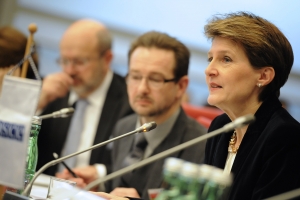Governments must step up fight against human trafficking, protect victims, prosecute criminals
Prominent European officials are calling on governments at an international anti-trafficking conference in Vienna to intensify the fight against modern-day slavery by taking specific steps to protect victims and prosecute the criminals who commit this terrible crime.

Swiss Justice Minister Simonetta Sommaruga, speaking at an international anti-trafficking conference jointly hosted by the OSCE and the Council of Europe, Vienna, 17 February 2014.
“Trafficking in human beings happens on a daily basis all over our region, from Vancouver to Vladivostok. This must be stopped,” said Austrian Foreign Minister Sebastian Kurz, Chair of the Council of Europe’s Committee of Ministers. “In a welcome step, the Council of Europe and the OSCE commit to joining forces to this end.”
The conference, organized under the Swiss Chairmanship of the Organization for Security and Co-operation in Europe (OSCE) and the Austrian Chairmanship of the Council of Europe, is taking stock of work done by both organizations.
“We can never turn a blind eye to trafficking in human beings, which is much broader than a mere problem of prostitution,” Swiss Justice Minister Simonetta Sommaruga said. “The criminal networks managing trafficking in human beings harm society in many ways. The challenge of destination countries is to identify victims of exploitation in prostitution and beyond and to prosecute offenders consistently. In order to be successful, well-established national and international co-operation is indispensable.”
Trafficking is a human rights violation on a massive scale. According to the International Labour Organization (ILO) there are 20.9 million victims of trafficking and forced labour globally. Despite the size of the problem, there are shockingly few prosecutions: the U.S. State Department’s Trafficking in Persons Report recorded just 7,705 prosecutions globally in 2012.
The conference participants will assess existing challenges and discuss possible solutions, such as stronger partnerships with NGOs, increased training for law enforcement and more assistance and protection for trafficking victims. They will specifically review steps to better reintegrate victims into society, from processing applications for residence permits and work permits, to providing psychosocial support that can help people overcome the trauma of their experiences.
Austrian Interior Minister Johanna Mikl-Leitner, said: "Victim identification and reintegration are among key challenges posed by human trafficking, and close international co-operation between the police, the judiciary and society is essential to tackle them. We are very well aware of the decisive role the police play in this respect, as they are often the first on site in situations where there are potential victims and perpetrators."
In the run-up to the event, the Council of Europe’s Group of Experts on Action against Trafficking in Human Beings has evaluated policies in almost 30 European countries. Council of Europe Secretary General Thorbjørn Jagland referred to some findings of the report: “Although progress has been achieved in the fight against human trafficking, formidable challenges remain – from assisting Roma communities, which are particularly vulnerable to trafficking, to increasing co-operation with private companies that can assist in identifying human traffickers.”
OSCE Secretary General Lamberto Zannier voiced his strong support for the Council’s work and called upon the two organizations to work together even more closely to help eliminate this disturbing crime.
“This joint conference offers not only a valuable platform to engage in further dialogue and exchange best practices, but more importantly gives us the opportunity to look ahead and discuss what else can be done to make partnerships work better,” he said.
Source: Organization for Security and Co-operation in Europe
- 492 reads
Human Rights
Fostering a More Humane World: The 28th Eurasian Economic Summi

Conscience, Hope, and Action: Keys to Global Peace and Sustainability

Ringing FOWPAL’s Peace Bell for the World:Nobel Peace Prize Laureates’ Visions and Actions

Protecting the World’s Cultural Diversity for a Sustainable Future

Puppet Show I International Friendship Day 2020

